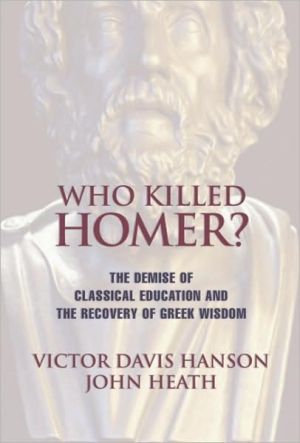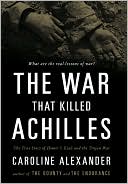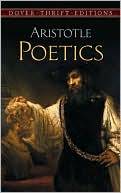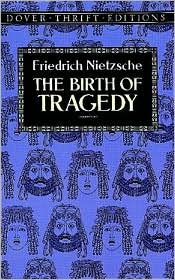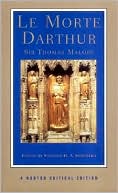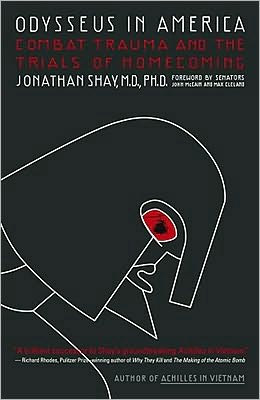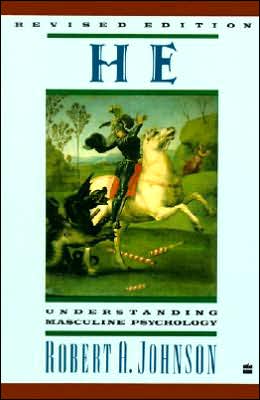Who Killed Homer?: The Demise of Classical Education and the Recovery of Greek Wisdom
An in-depth study of why the Greek point of view is crucial to a well-rounded education, Who Killed Homer? analyzes how and why it is vanishing from our present-day educational system. This impassioned call to arms argues that if we lose our knowledge of the Greeks, we lose our understanding of who we are. \ \ The literature, art, philosophy, and values of the Classical World have been synonymous with Western education itself. The traditions of the Greeks explain why Western culture is so...
Search in google:
With straightforward advice and informative readings of the great Greek texts, the authors show how we might still save classics and the Greeks for future generations. Who Killed Homer? is must reading for anyone who agrees that knowledge of classics acquaints us with the beauty and perils of our own culture.Publishers Weekly"To help one's friends and hurt one's enemies is the central tenet of Archaic Greek morality," write the authors. Unfortunately, one would have preferred more of the first and rather less of the second. The authors' "enemies" are the orthodoxy-honing, text-diddling academics whom many readers familiar with the culture wars already hope will follow their Scholastic forebears into oblivion. While there is a guilty pleasure to reading the lengthy excerpts that the authors include as examples of the wretched state of academic prose, these really are dead horses, well beaten. But Hanson and Heath, two classicists, each with over two decades of studying and teaching, are luckily unrepentant philhellenes, and they offer a spirited defense of the Greeks; to a lesser extent, the Romans; and the scholars whom they admire. Neatly combating the argument that because Greeks were misogynistic, slave-owning syllogists, they can be ignored, the authors try to remind readers how to think like the ancient Greeks in matters that count. While the Greeks are often blamed for encroaching materialism, avarice, self-indulgence and soullessness, we often fail to consider the countering forces of moderation, civic responsibility and unbending moral code that governed life in a polis. Hanson and Heath shine here, bringing out numerous classical admonitions and cautionary tales from Homer to Antigone, to lessons to be learned from the Greeks at war. Free speech, self-criticism, broad inquisitiveness, democracy, individualism and the like, we are reminded, are good things. Perhaps for their next book, Hanson and Heath will ignore their colleagues and address themselves wholly to the demos. It's what Pericles would have wanted. (Apr.)
WHO KILLED HOMER?\ The Demise of Classical Education and the Recovery of Greek Wisdom \ \ By VICTOR DAVIS HANSON JOHN HEATH \ ENCOUNTER BOOKS\ Copyright © 2001 Victor Davis Hanson and John Heath\ All right reserved.\ ISBN: 1893554260 \ \ \ \ Chapter One\ \ \ Yes, and in my time I have dealt with better men than you are, and never once did they disregard me. Never yet have I seen nor shall see again such men as these were ... ... These were the strongest generation of earth-born mortals, the strongest, and they fought against the strongest, the beast men living within the mountains, and terribly they destroyed them. I was of the company of these men, coming from Pylos, a long way from a distant land, since they had summoned me. And I fought single-handed, yet against such men no one of the mortals now alive upon earth could do battle.\ \ (Nestor to Achilles and Agamemnon)\ \ \ In the single year 1992, Classicists published and reviewed 16,168 articles, monographs, and books about the Greeks and Romans. The work of over 10,000 individual scholars appeared in nearly 1,000 different journals. We are a busy profession in our eleventh hour. Researchers on Homer's Iliad and Odyssey alone produced more than 200 publications in nine modern languages, not including the scores of studies of the historical, archaeological, and linguistic background to the Homeric texts. These articles and books represent officially published material; perhaps as much was written in even more obscure journals or local academic newsletters and bulletins.\ A comparison of the professional output of 1992 with that of 1962 reveals the remarkable growth in the industry of Classical scholarship in just the past three decades: twice as many scholars now publish 50 percent more material in twice as many journals. A reference aid containing abbreviations of journals, series, and standard works "that classicists most frequently find in the scholarship of their discipline" lists more than 4,400 separate titles (J. S. Wellington, Dictionary of Bibliographic Abbreviations Found in the Scholarship of Classical Studies and Related Disciplines [Westport, CT, 1983] p. xi). No Classicist alive knows even the serial numbers of his trade any more, so enormous has the machinery of academic production become.\ Scholars themselves cannot even keep up with the publications in their own subspecialty of Classics. The author of a recent 470-page book on the Iliad, for example, comments at the beginning of his bibliography (itself twenty-five pages containing over seven hundred items): "A few sources mentioned in passing in the notes I have omitted, in the interest of economy [!], as peripheral; even in work central to the Homeric Question, there can be no question of completeness" (K. Stanley, The Shield Of Homer: Narrative Structure in the Iliad [Princeton, 1993], p. 427). Scholars, who now write for a few dozen of so readers, confess that, after reading some seven hundred secondary works in their field, even they cannot master their own bibliographies. Is this abundance of Classical scholarship a sign of a healthy, flourishing, and important discipline? Or is it, in fact, symptomatic-and explicatory-of its very demise?\ Different statistics might tell a very different story. At the same time as scholarly publication was soaring, the number of nonprofessionals in America actually reading about or studying the Classical world took a nose-dive. Seven hundred thousand high school students enrolled in first-year Latin in 1962. By 1976, enrollments had plunged 80 percent, to 150,000. In but fifteen years, over a half-million fewer Americans enrolled in this fundamental class of Classical studies. In this Golden Age of Classics publication, the number of college Latin students plummeted from 40,000 in 1965 to 25,000 just nine years later, and enrollments have not recovered. The full data on the 1990s are not yet in; but ad hoc and informal information suggests that the decline continues, if not at an accelerated rate.\ Between 1971 and 1991 the number of Classics majors dropped by 30 percent, as did Greek enrollments in the decade from 1977 to 1986. Of over one million B.A.s awarded in 1994, only six hundred were granted in Classics, meaning that there are now five or six Classics professors in the country for every senior Classics major, over thirty articles and books each year for every graduating student.\ One of the authors of a recent survey of the study of Classical Greek in North America observed that enrollments in a new sequence of Greek courses at her university dwindled over four semesters from twenty-five to ten to five to two. The sequence was canceled, she concludes, despite-and who says politicians have a monopoly on "spin"?-"the unquestionable success of the experiment" (M. Skinner et al., "Greek 2000-Crisis, Challenge, Deadline," The Classical Journal 91 [1996] 406). Two students now completing a Greek sequence at a major university is labeled "success."\ \ Falling student numbers are, of course, not the only symptom of our malignancy. The death of Classics can also be measured not just in the number of students, but in the kind of students and the quality of their education. Classics majors in the 1970s had the highest GRE scores in the humanities, fifty points higher than majors in English. By the mid-1990s the gap had nearly disappeared, but the movement was in all one direction: the scores of English majors remained virtually unchanged, while the average for Classics majors dropped forty-four points. By any objective criterion Classics faculty fared just as poorly: there are now fewer doctoral programs in Classics than in any other discipline surveyed; even with cutbacks at graduate programs, Classics still has one of the poorest rates of employment in the humanities for recent Ph.D.s and, on average, the second-lowest salary in the humanities.\ Our own admittedly personal experiences bear these statistics out. At the two institutions where we each created Classics programs ex nihilo in the mid-1980s, Classics is now essentially comatose. At Rollins College, where just six years ago there was one tenured and one tenure-track Classicist, there are no longer any tenure-track positions at all. The endowed chair once earmarked for Classics has been diverted from Greek and Latin instruction. At California State University at Fresno the newly arrived president, faced with budget cuts, in 1992 targeted the entire Classics and Humanities program for elimination and laid off its tenured faculty, suspending instruction itself. In 1993 that program had four full-time positions; now there are two, and it has taken three years of extra effort to restore a third. Faculty are under constant pressure to teach only humanities and Western civilization courses (which are for a while longer part of the general education menu) in lieu of upper-division Latin and Greek.\ We have had as many as 176 applicants for a single faculty position (one small Classics department had 141 applicants in 1996 for a one-year, nonrenewable appointment). Even the rumors of part-time sabbatical replacement billets at places like California State University at Fresno or Santa Clara University bring us dozens of calls from unemployed Classics Ph.D.s at Yale, Berkeley, and Stanford. We both know that, should we leave or retire from our present places of employment, we-like most others in the profession-will not be replaced.\ We cite the above statistics simply to document the obvious: the Greeks, unfamiliar to the general public at large, are also now dead in the university itself. Today Classics embraces a body of knowledge and a way of looking at the world that are virtually unrecognized, an almost extinct species even in its own protected habitat, the academic department. We Classicists are the dodo birds of academia; when we retire or die, our positions are either eliminated or replaced with temporary and part-time help.\ But why are the Greeks unknown now? America is its wealthiest; its universities are larger than ever; the numbers of senior Classics professors, graduate programs, publications, computer bulletin boards and professional conferences are at all-time highs. Why such dismal interest now, despite the availability of Greek wisdom through an unprecedented number of high-quality and affordable translations? At the very moment in our history when Homer might be helping to remind us of who we are, why we got here, and where we should go, only a handful of Americans know the Greeks-or care that Classics is dying. If we are writing so much, why are all the others reading so little of it? In our identity-obsessed age, why haven't we Westerners been led by our very busy professors and scholars back to the beauty and the wisdom-and the power-of our own culture?\ The death of Homer, looked at in historical perspective, has come about with considerable swiftness. Just thirty years ago Classics was still an important part of Western education. A plumber, a cook, or a farmer might have had a year of Latin in high school, might have been able to translate carpe diem on a teen-ager's T-shirt. For over two millennia the educated and enlightened in the West had been dragged through "the Classics" from an early age. The study of Greek and Latin languages and literatures was acknowledged to be the perfect training for nearly every profession, whether one was heading towards business, law, medicine, the voting booth, or a constitutional convention. What, then, has finished off at the millennium this tradition of liberal education, one that for two thousand years served its constituents so well?\ The answer is not as obvious as one might think. The traditional charges against Classics are as old as Greek culture itself. You all know the litany: "Why would anyone want to borrow money to study that?" "Greek and Latin won't get you a job." The study of Greek is difficult, irrelevant to the modern world, impractical, it is said, and almost unhealthy. Television, the corporations, videos, the economy did it to us, Classicists explain. After all, when a mere B.A. can costa hundred thousand dollars, who can blame today's students-or their tuition-borrowing parents-for confusing education with job training, for scouring college catalogues for something that looks "practical"? Accounting, hotel management, recreation supervision, and Radio and Sports Reporting (an actual course in the humanities at Santa Clara University) do radiate an unexpected charm. "The Theory of Walking" and "Star Trek and the Humanities" (authentic classes at California State University at Fresno) ensure higher grades with less work than introductory Greek. As the school loans grow, so does an Aristophanic vision of the Classics graduate as an unemployable couch potato who wields his newly acquired Socratic dialectic to convince his father that money is virtue, virtue is knowledge, and knowledge comes from Star Trek reruns.\ Yet these are but the age-old wages of Classics: those who study the ancient world have always borne the burden of demonstrating to the living the importance and relevance of the long-ago dead. Until recently, the missionaries of Classics in the West, energized by the texts they read, the art they knew, always met-and took a perverse delight in-that challenge. But in a reversal of the history of Western education-a history that has in some part merely been the story of the successful defense of the Classical curriculum against these very denunciations-the academy has for three decades now offered no response to the usual challenges. The better among us simply quit. The worse destroyed, often consciously, their own profession.\ To appreciate the novelty and significance of our recent failure, we must first take a look at the historical position of Classics in education. It is an oft-told story, but the narrators so often miss the key point: Homer has weathered every challenge, deflected all threats, repelled incursion after incursion-often emerging bruised, sometimes vitalized, but invariably intact-until very recently. Greek has always been unique; thus it demanded a special type of guardian if it was to survive yet one more generation. And it has always had such selfless stewards, however few and beleaguered, however odd and alienated from the professional apparatus of Classics, however obscure and unknown they have been to the public at large.\ \ \ Mastery of the Iliad and Odyssey formed the basis for acculturation for the Greeks themselves-Homer was the "Educator of Greece," his poetry "the Book." But there were never any sacred cows, or sacred texts, in ancient Greece. The first potent challenge to Homer's primacy came four centuries later from the philosopher Plato, who expelled the study of Homer and the tragedians from his ideal societies, pointing out that (in addition to certain broader metaphysical objections) these tales presented false and unwholesome pictures of the gods and heroes. Zeus transformed into barnyard animals in order to entice unsuspecting maidens onto his lap? Hera seducing her husband in order to wipe out the Trojans? Thyestes dining on his kids? These "old wives' tales" were hardly the stuff our children should read to become virtuous adults.\ But even the brilliant Plato could not banish Homer. His own characterization of Socrates relies frequently on Homeric and tragic exempla to examine a life of virtue:\ You are wrong, my friend, if you think that a man who is worth anything ought take into consideration the risk of life or death instead of looking to this only, whether in his actions he acts rightly of wrongly, and whether he acts like a good or a bad man. For according to your argument, all the heroes who died at Troy were worthless, even Achilles, for whom disdaining danger was preferable to enduring disgrace. (Plato, Apology)\ A generation later, the more systematic philosopher Aristotle dismantled Plato's charges, on both moral and metaphysical grounds; Plato's rejection of Homer had made little headway into popular Greek culture anyway.\ This impassioned attack and defense became the pattern of criticism and response for over two millennia until the 1960s. The classics were accused of being too difficult, inappropriate, irrelevant, impractical, brutal, immoral, of old-even for the "modern" world of fourth-century-B.C. Athens. Supporters of the Classics countered, vigorously so, with demonstrations of how "practical," how essential, the study of Greek (and Latin) languages, literatures, and history was to literacy, an aesthetic sense, the building of knowledge, critical thinking, and a moral foundation. Classics soon comprised an essential core of Western learning in language, reasoning, ethics, aesthetics, and philosophy.\ \ Continues...\ \ \ \ Excerpted from WHO KILLED HOMER? by VICTOR DAVIS HANSON JOHN HEATH Copyright © 2001 by Victor Davis Hanson and John Heath. Excerpted by permission.\ All rights reserved. No part of this excerpt may be reproduced or reprinted without permission in writing from the publisher.\ Excerpts are provided by Dial-A-Book Inc. solely for the personal use of visitors to this web site. \ \
Preface to the Paperback EditionxiProloguexix1Homer is Dead12Thinking Like a Greek213Who Killed Homer--and Why?814Teaching Greek is not Easy1615What We Could Do209AppendixWhen All We Can Do is Read251Afterword: A Reply to Our Critics275Acknowledgments311Notes313Index317
\ Publishers Weekly - Publisher's Weekly\ "To help one's friends and hurt one's enemies is the central tenet of Archaic Greek morality," write the authors. Unfortunately, one would have preferred more of the first and rather less of the second. The authors' "enemies" are the orthodoxy-honing, text-diddling academics whom many readers familiar with the culture wars already hope will follow their Scholastic forebears into oblivion. While there is a guilty pleasure to reading the lengthy excerpts that the authors include as examples of the wretched state of academic prose, these really are dead horses, well beaten. But Hanson and Heath, two classicists, each with over two decades of studying and teaching, are luckily unrepentant philhellenes, and they offer a spirited defense of the Greeks; to a lesser extent, the Romans; and the scholars whom they admire. Neatly combating the argument that because Greeks were misogynistic, slave-owning syllogists, they can be ignored, the authors try to remind readers how to think like the ancient Greeks in matters that count. While the Greeks are often blamed for encroaching materialism, avarice, self-indulgence and soullessness, we often fail to consider the countering forces of moderation, civic responsibility and unbending moral code that governed life in a polis. Hanson and Heath shine here, bringing out numerous classical admonitions and cautionary tales from Homer to Antigone, to lessons to be learned from the Greeks at war. Free speech, self-criticism, broad inquisitiveness, democracy, individualism and the like, we are reminded, are good things. Perhaps for their next book, Hanson and Heath will ignore their colleagues and address themselves wholly to the demos. It's what Pericles would have wanted. (Apr.)\ \ \ \ \ Library JournalAccording to Hanson (Greek, California State Univ., Fresno; Field Without Dreams, LJ 1/96) and Heath (classics, Santa Clara Univ.), classicists are a dying breed, which should be cause for alarm. The authors argue that to understand our own culture, we must first understand Western civilization's origins in Greece, and "to ignore or destroy Classics is to commit cultural suicide." Hanson and Heath offer their own ideas of an ideal core curriculum for students, which would begin with two years of Greek or Latin. They also outline new approaches to teaching the classics. It is the authors' hope that from the next generation will emerge "a new Greek, a Homer not part of a Mycenean palace, but one accessible to, and the property of, everyone, more in the spirit of the true Greek polis." This attempt to save the classics will appeal only to those who already have deep convictions about them, while it is the "common man" they need most to convince. For larger public libraries and academic libraries.Terry Christner, Hutchinson P.L., Kan.\ \ \ James DavidsonVictor Davis Hanson and John Heath between them have written a mean and unpleasant book. The apparent argument is easily summarized, although its detailed exposition is riddled with inconsistencies. Homer (Classics) is enormously important, but now Homer, catastrophically, is dead. He didn't die of natural causes. He was assassinated. Who killed Homer? Classicists did. \ ...The whole "death of Homer" thing looked and still looks like a theme opportunistically tagged on, to draw attention to some minor personal gripes and some majorly weird theories about Evil in Human Nature, Salvation in Greek Wisdom, and the supremacy of Western Civilization for good or ill; the real battleground was always elsewhere, what classicists should and shouldn't be allowed to teach, what "true Classics" is...Much of the book, in fact, is nothing more than a laundry basket, with every piece of "dirty linen" the authors can find, even if they have to invent it—I know of no classicist who explains Caligula's tyranny, for instance, by asking "Was he ever really hugged?"—itemized and put on public display.\ —The (London) Times Literary Supplement\ \ \ \ \ \ Kirkus ReviewsJuvenalian ridicule, Ciceronian argument, and Cato-like censure animate a lively defense of the deadest of dead languages and dead white European males. Cynicism, skepticism, and invective are all Greek and Latin concepts, as Hanson (Greek/Calif. State Univ., Fresno) and Heath (Classics/Santa Clara Univ.) remind their readers while ruthlessly employing the same in this debate over the decline and fall of Classics. Killing off Homer and the teaching thereof, as they argue in their impassioned philippic, was "an inside job by elite philologists and theorists of the present age." Their book, as they readily admit, is a later addition to the genre of the academic expos‚ made popular in the '80s by Allan Bloom, Camille Paglia, Dinesh D'Souza, et al., in which higher education is revealed to be suffering variously from philistine utilitarianism, feel-good social science, radical chic, sophistic theory, multicultural Balkanization, and self-promoting careerism. While the ensuing Culture Wars have raged over the humanities in general, Classics has also suffered from falling undergraduate enrollment, chronic underemployment for new Ph.D.s, and other scourges. Hanson and Heath are not so much right-wing revisionists as passionate Hellenists whose belief in Greece and Rome's central role in Western civilization is fervent and articulate. Writing against the multicultural grain, they stress the unique aspects of Greek and Roman society, e.g., the idea of open dissent in the polis and the concept of civilian militias and citizen-soldiers, and maintain the continued importance of The Iliad and The Odyssey. Their rigorous pedagogic program for returning Classics to a pride of place in the humanities,however, involves too many Draconian measures—scrapping the doctoral dissertation, ending post-doc fellowships, junking peer conference junkets—to be practical. An elegy that slaughters a hecatomb of sacred cows along the way.\ \
